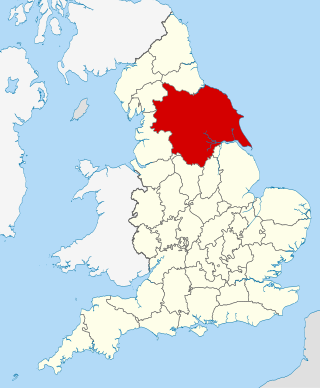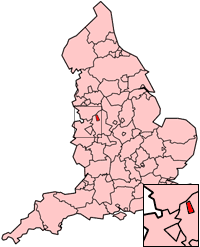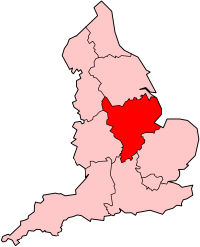British English is the set of varieties of the English language native to the United Kingdom. More narrowly, it can refer specifically to the English language in England, or, more broadly, to the collective dialects of English throughout the British Isles taken as a single umbrella variety, for instance additionally incorporating Scottish English, Welsh English, and Northern Irish English. Tom McArthur in the Oxford Guide to World English acknowledges that British English shares "all the ambiguities and tensions [with] the word 'British' and as a result can be used and interpreted in two ways, more broadly or more narrowly, within a range of blurring and ambiguity".
Hiberno-English or Irish English (IrE), also formerly sometimes called Anglo-Irish, is the set of dialects of English native to the island of Ireland. In both the Republic of Ireland and Northern Ireland, English is the dominant first language in everyday use and, alongside the Irish language, one of two official languages.

William Shakespeare was an English playwright, poet and actor. He is widely regarded as the greatest writer in the English language and the world's pre-eminent dramatist. He is often called England's national poet and the "Bard of Avon". His extant works, including collaborations, consist of some 39 plays, 154 sonnets, three long narrative poems and a few other verses, some of uncertain authorship. His plays have been translated into every major living language and are performed more often than those of any other playwright. Shakespeare remains arguably the most influential writer in the English language, and his works continue to be studied and reinterpreted.
Cockney is a dialect of the English language, mainly spoken in London and its environs, particularly by Londoners with working-class and lower middle-class roots. The term Cockney is also used as a demonym for a person from the East End, or, traditionally, born within earshot of Bow Bells.
"Cunt" is a vulgar word for the vulva in its primary sense, but it is used in a variety of ways, including as a term of disparagement. "Cunt" is often used as a disparaging and obscene term for a woman in the United States, an unpleasant or objectionable person in the United Kingdom and Ireland, or a contemptible man in Australia and New Zealand. In Australia and New Zealand, it can also be a neutral or positive term when used with a positive qualifier. The term has various derivative senses, including adjective and verb uses.

The Tragedy of King Lear, often shortened to King Lear, is a tragedy written by William Shakespeare. It is loosely based on the mythological Leir of Britain. King Lear, in preparation for his old age, divides his power and land between his daughters Goneril and Regan, who pay homage to gain favour, feigning love. The King's third daughter, Cordelia, is offered a third of his kingdom also, but refuses to be insincere in her praise and affection. She instead offers the respect of a daughter and is disowned by Lear who seeks flattery. Regan and Goneril subsequently break promises to host Lear and his entourage, so he opts to become homeless and destitute, and goes insane. The French King married to Cordelia then invades Britain to restore order and Lear's rule. In a subplot, Edmund, the illegitimate son of Gloucester, betrays his brother and father. Tragically, Lear, Cordelia and several other main characters die.

The word thou is a second-person singular pronoun in English. It is now largely archaic, having been replaced in most contexts by the word you, although it remains in use in parts of Northern England and in Scots. Thou is the nominative form; the oblique/objective form is thee ; the possessive is thy (adjective) or thine ; and the reflexive is thyself. When thou is the grammatical subject of a finite verb in the indicative mood, the verb form typically ends in -(e)st, but in some cases just -t.
The Brummie dialect, or more formally the Birmingham dialect, is spoken by many people in Birmingham, England, and some of its surrounding area. "Brummie" is also a demonym for people from Birmingham. It is often erroneously used in referring to all accents of the West Midlands, as it is markedly distinct from the traditional accent of the adjacent Black Country, but modern-day population mobility has tended to blur the distinction. Population mobility has meant that to a degree, the Brummie accent extends into some parts of the Metropolitan Borough of Solihull, but much of the accent within the borough might be considered to be closer to contemporary Received Pronunciation (RP).
Scottish English is the set of varieties of the English language spoken in Scotland. The transregional, standardised variety is called Scottish Standard English or Standard Scottish English (SSE). Scottish Standard English may be defined as "the characteristic speech of the professional class [in Scotland] and the accepted norm in schools". IETF language tag for "Scottish Standard English" is en-scotland.

Scouse, more formally known as Liverpool English or Merseyside English, is an accent and dialect of English associated with the city of Liverpool and the surrounding Liverpool City Region. The Scouse accent is highly distinctive, as it was heavily influenced by Irish and Welsh immigrants who arrived via the Liverpool docks, as well as Scandinavian sailors who also used the docks, and thus has very little in common with the accents in the rest of England. People from Liverpool are known as Liverpudlians, but are usually called Scousers; the name comes from scouse, a stew originating from Scandinavian lobscouse eaten by sailors and locals.

William Charles Macready was an English stage actor. The son of Irish actor-manager William Macready the Elder he emerged as a leading West End performer during the Regency era.

West Country English is a group of English language varieties and accents used by much of the native population of the West Country, an area found in the southwest of England.

Yorkshire dialect, also known as Yorkshire English, Broad Yorkshire, Tyke, or Yorkie, is a grouping of several regionally neighbouring dialects of English spoken in the Yorkshire area of Northern England. The varieties have roots in Old English and are influenced to a greater extent by Old Norse than Standard English is. Yorkshire experienced drastic dialect levelling in the 20th century, eroding many traditional features, though variation and even innovations persist, at both the regional and sub-regional levels. Organisations such as the Yorkshire Dialect Society and the East Riding Dialect Society exist to promote the survival of the more traditional features.
Mockney is an affected accent and form of speech in imitation of cockney or working-class London speech, or a person with such an accent. A stereotypical mockney speaker comes from an upper-middle-class background.

Sir Simon Russell Beale is an English actor. He has been described by The Independent as "the greatest stage actor of his generation". He has received various accolades, including two BAFTA Awards, three Olivier Awards, and a Tony Award. For his services to drama, he was knighted by Queen Elizabeth II in 2019.

Potteries is an English dialect of the West Midlands of England, almost exclusively in and around Stoke-on-Trent, Staffordshire.

East Midlands English is a dialect, including local and social variations spoken in most parts of East Midlands England. It generally includes areas east of Watling Street, north of an isogloss separating it from variants of Southern English and East Anglian English, and south of another separating it from Northern English dialects.

English is a West Germanic language in the Indo-European language family, whose speakers, called Anglophones, originated in early medieval England on the island of Great Britain. The namesake of the language is the Angles, one of the Germanic peoples that migrated to Britain after its Roman occupiers left. English is the most spoken language in the world, primarily due to the global influences of the former British Empire and the United States. English is the third-most spoken native language, after Mandarin Chinese and Spanish; it is also the most widely learned second language in the world, with more second-language speakers than native speakers.

Thousands of performances of William Shakespeare's plays have been staged since the end of the 16th century. While Shakespeare was alive, many of his greatest plays were performed by the Lord Chamberlain's Men and King's Men acting companies at the Globe and Blackfriars Theatres. Among the actors of these original performances were Richard Burbage, Richard Cowley, and William Kempe.
The English language spoken and written in England encompasses a diverse range of accents and dialects. The language forms part of the broader British English, along with other varieties in the United Kingdom. Terms used to refer to the English language spoken and written in England include English English and Anglo-English.










